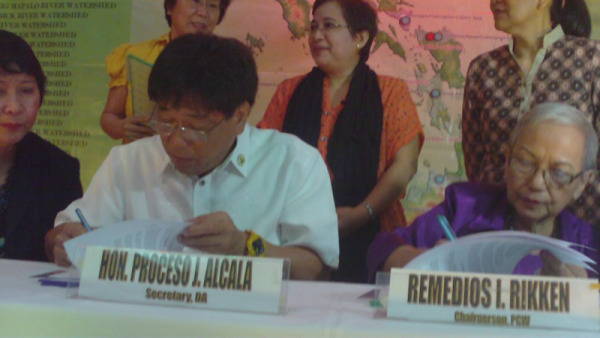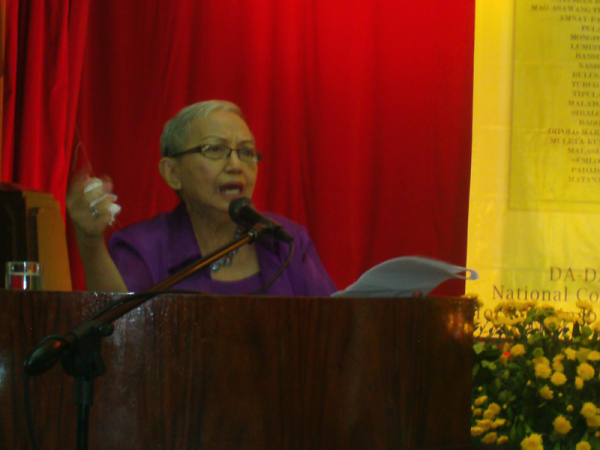From GREAT to GREATer: DA and PCW seal agreement on women’s economic empowerment

“Maaaring pagsama-samahin ang mga kakayahan … ng iba’t ibang ahensya upang maging makatotohanan ang pagtulong ng gobyerno para sa pagbuo ng sustainable micro-enterprises ng mga kababaihan (Agencies can pull together resources to make government more effective in forming women’s sustainable micro-enterprises),” Chairperson of the Philippine Commission on Women (PCW) Remedios Ignacio-Rikken said, during the ceremony sealing PCW’s agreement with the Department of Agriculture (DA).
The PCW-DA partnership replicates PCW’s Gender-Responsive Economic Actions for the Transformation of Women (GREAT Women) Project supported by the Canadian International Development Agency (CIDA) since 2006 and scheduled to culminate next year. In the GREAT Women Project, the PCW collaborated with 12 national government agencies, 8 pilot provincial governments and 35 municipal local government units in strengthening the national and local government capacities to establish and develop women-led micro, small and medium enterprises. Proud of project results backed up by hard evidence on improvement in women’s lives, PCW is hopeful that replicating through convergence with national agencies will magnify the project impact, particularly in rural communities.
DA Secretary Proceso Alcala, expressing his strong support for the initiative, emphasized the importance of strengthening women’s organized involvement because of their role in ensuring food security, sustainable rural development and poverty reduction. Secretary Alcala also shared government’s plan to start exporting rice varieties next year as the country heads on to rice self-sufficiency and surplus a year after that. “Bahagi po ng ating layunin na palakasin ang hanay ng mga kababaihan,” Secretary Alcala stated.
“When DILG Undersecretary Austere Panadero heard these success stories,” Rikken recalls, “he urged us to partner with government agencies that have substantial budgets for livelihood projects, mentioning DA in particular as playing an active role in the convergence process. Missing DA in the loop, is missing the boat,” Rikken adds.
Department of Agrarian Reform Secretary (DAR) Virgilio Delos Reyes and Department of Environment and Natural Resources (DENR) Assistant Secretary Marlo Mendoza talked about their agencies’ programs during the event. Representatives of farmers’ organizations, government officials and staff witnessed the event.
THE MAGIC OF CONVERGENCE
Remedios I. Rikken
Chairperson
Philippine Commission on Women

Honorable Secretaries:Secretary Alcala, Secretary Paje, Secretary delos Reyes, Secretary Abad, Secretary Domingo , distinguished guests, ladies and gentlemen:
Let me say my piece in three minutes. I was Executive Director of the National Commission on the Role of Filipino Women for nine years under President Corazon Aquino and President Fidel Ramos. Last December 2011 President Aquino appointed me Chair of what is now called Philippine Commission on Women. In all that nine years I never used the term CONVERGENCE. But looking back we must have been practicing the essentials of CONVERGENCE or else we could not have done the following:
First in responding to the challenge of the end of the Decade UN Third World Conference on Women in Nairobi that member states should not only depend on their National Machinery for Women but should see to it that all government agencies must look at all their Policies, Programs and Activities as to their impact on women, men and children. WE adopted what we termed the Bibingka Principal – with apoy sa ibabaw and apoy sa ilalim. The heat on top represents the government agencies who will re-examine their PPAs and the fire below would signify the NGOs and women’s organization or movements who will pressure government for the need for change.
Second – our first move was to organize Eleven Consultations on Rural Women; Women and Education; Women and Family; Women and Health; Women and Labor; Women and Research; Women and Sexual Exploitation; Women Arts and Culture; Women and Community Organization; Women and Media and Women and Law, Policy and Action. Each consultation was organized in partnership with groups of women coming from across the political spectrum and various sectors as well as academe.
This was a serendipitous move because these consultations would later provide the framework for the development of the Philippine Development Plan for Women (1987-1992) or PDPW, the first ever development plan for women in Southeast Asia. According to UNIFEM it prompted other countries to do the same. Without the initial PDPW, President Ramos Cabinet would not have approved the successor 30 year Philippine Plan for Gender and Development (PPGD).
PDPW laid the ground for the enactment of landmark laws on women : the RA 7192 known as the Women in Development and Nation Building Act ; RA 6725 which is directed specifically against unequal pay for work of equal value; RA 7877 or the Anti-Sexual Harassment Act ; and RA 6955 which is aimed against “mail-order bride “ business.
Another inspired move was when we realized for NCRFW to be taken seriously our 1001 stories of women must be supported by hard data. Thus we were able to get all National Government Agencies Statistic Offices together with NSCB and NSO to meet regularly in the Commission and discuss common problems and exchange experiences. This gave birth to what we initially called Our Statistic Sorority. And was officially called Inter-agency Committee on Women and Statistics where the Bureau of Agricultural Statics was an active member. Its first major statistical endeavour was the production and publication of the first edition of Statistics on Filipino Women. The IAC on Women and Statistics has been strengthened and expanded into the Inter Agency on Committee on Gender Statistics which the Commission chairs. One of the key contributions of this Committee is influencing the development of the Philippine Statistical Development Plan to adopt gender-responsive indicators. The Statistics on Filipino Women has evolved into the Fact Sheet On Women and Men in the Philippines showing comparative data on the situation of our women and men.
I could give other examples of what I can now call examples of Convergence such as our decision to organize Gender Focal Points in every major National Government Agencies.
If Secretary Abad still recalls, as a newly-appointed DAR Secretary, he approved our suggestion to change the certificate of land ownerships to joint titles, to include both spouses.
All these “ convergence “ efforts have become the essential elements and building blocks of what we now call as the gender mainstreaming strategy. A number of international agencies played key roles in strengthening this strategy one of which is the Canadian International Development Agency or CIDA . The first years of CIDA assistance to the Commission focused on massive consciousness raising on gender issues to open the way for gender-sensitive policy making and building of strategic champions in the bureaucracy.
What new developments are we into under President Aquino’s administration? To operationalize the gender provisions in the Philippine Development Plan and the implementation of the Magna Carta of Women we are in the process of preparing the Women Empowerment and Development toward Gender Equality or the WEDGE Plan again a product of convergence of government and non-government agencies. I wish to thank Secretaries Alcala, Paje, delos Reyes and Domingo for the active participation of your technical staff in drafting the Plan.
Now let me come to what we are here signing today. For the first time PCW implemented a project called Gender Responsive Economic Actions for the Transformation of Women or GREAT Women Project. It is a capacity building project and one of its aims is to create an enabling environment for women’s economic empowerment at the local level. The process calls for gender training and defining of roles of LGUs, the women micro entrepreneurs, the National Government Agencies in the Region. This resulted in the different offices of the mayor or the governor to define their coming together; the women to find their voices to state their situation; and the NGAs instead of coming one by one in their area of operation, started to work together and define what they can contribute to the process. Thus the word CONFERGENCE became the key word.
Sa GREAT Women Project, pinatunayan na maaaring pagsama-samahin ang mga kakayahan at mga programang iba’t ibang ahensya upang maging makatotohananang pagtulong ng gobyerno para sapagbuo ng sustainable micro-enterprises ng mga kababaihan. Convergence of efforts to build enabling environments makes women’s sustainable micro-enterprises possible.
When Usec Austere Panadero heard these success stories, he frankly told us that as far as DILG is concerned the Great Women Project is just another Pilot Project. PCW and CIDA, its source of funding are happy with the way it is going. The question is how do we mainstream it and his suggestion was for PCW and DILG to see how other NGA with substantial budget for livelihood projects can see Great Women Project processes and urge them to see if they can adopt its ways of doing things. He gave as an example the DA and DOLE.
But this is not the only reason why we have proposed a partnership with you Sec. Alcala. In the pilot LGUs that we mentioned, D.A. plays an active role in the convergence process and to us, missing D.A. in the loop, is missing the boat. I understand that NCI adopts the Local Convergence Agro-enterprise Clusters approach which I think is closely related with the GREAT Women convergence approach.
Perhaps we can explore how these two approaches can complement for a strengthened strategy to boost micro enterprise development and local economic development. We are delighted that you have accepted the partnership and we are thankful to Usec. Berna Romulo-Yap and Ms. Tess Bernardo for making this happen.
It is our hope that through this new partnership we will develop new convergence model or models that we can replicate to propel sustainable development. I will close with an update on what transpired in the concluded 56th Session of the United Nations Commission on the Status of Women or UNCSW in March of this year.
The theme during the 56th session was “Empowerment of rural women and their role in poverty and hunger eradication, development and current challenges.” In the Philippine government’s report to the UNCSW, Department of Social Welfare and Development Secretary Corazon “Dinky” Soliman– who was head of delegation– highlighted rural women’s economic empowerment and social enterprises as key strategies to address rural poverty and contribute to food security and sustainable development at the community level. Secretary Soliman pointed out that out that of the 14.34 million Filipino women in poor households, 10.4 million are in the rural areas.
Despite forming the bulk of poor women population, rural women are also the “major drivers of economic growth.” Sang-ayon po ako kay Secretary Dinky. Kailangan po nating tulunga ng umangat ang kalagayan at kabuhayan ng mga kababaihan sakanayunan kung nais nating maging maunlad at masagana ang ating mga komunidad at buongbansa. The answer the Magic and Demand of Convergence. Thank you. Good day to all.

